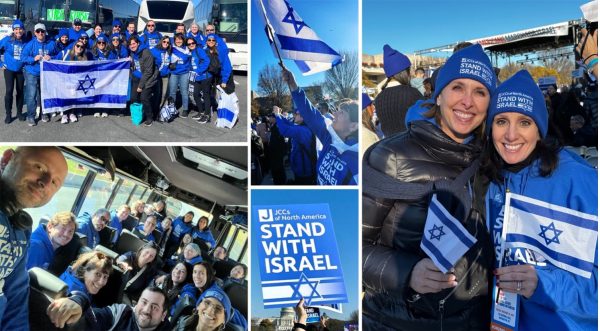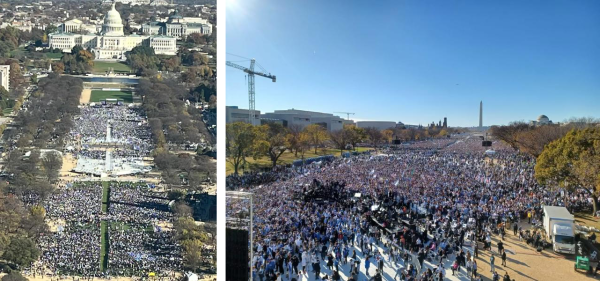By Jennifer Mamlet
Hinenu | הננו | We Are Here
“Slow-motion torment.” That’s how Rachel Goldberg, mother of hostage Hersh Goldberg-Polin, described what life has felt like since her son was stolen by Hamas on October 7. Of all the speeches I heard live on Tuesday in Washington, D.C., Rachel’s took my breath away.
With agonizing determination and haunting urgency on behalf of all the hostages, she spoke slowly and deliberately in a steely tone, asking, “Why is the world accepting that 240 human beings have been stolen and buried alive?” The world must prepare for what we will say to them, she urged.
By now, you’ve read the headlines. The November 14 March for Israel was the largest pro-Israel rally in U.S. history, and I was there. I was there to march for Israel. To free the hostages. And to fight antisemitism. I was there to be counted and to lead a delegation of JCC Association staff who had traveled from near and far. Twenty of us—including Doron’s wife, Janet—were among those in the caravan of nearly 2,000 buses that descended upon D.C. that morning. We met up with colleagues who’d flown in for the day and others who call the metro D.C. area home. I stood with JCC Association Board Vice Chair Lisie Gottdenker in the VIP section. They—like me—were there to be counted.

And counted we were. The final tally—an estimated 290,000—was representative of nearly every state in the union as well as delegations from Israel and Canada. A quarter of a million more watched via livestream.

The power of November 14—of 290,000 people saying “Hineni” | הנני | “Here I am”—will stay with me for the rest of my life. We were 290,000 distinct individuals marching in unison. Much like the 1.5 million people who come through our JCCs each week, the marchers were diverse. Young and old, liberal and conservative, right and left, secular and religious. In spite of a mix of languages, it wasn’t hard to understand the topic of conversation among our fellow marchers.
Despite our differences, we found strength in our unity. We spoke in one voice and stood shoulder to shoulder. We all got the dress code and showed up to fill the Washington Mall with shades of blue and white. We waved American, Israeli, and Canadian flags and held homemade signs and posters with the names and faces of hostages languishing in the dungeons of Gaza. Countless thousands were draped in Israeli flags that waved like the capes of superheroes. The resounding effect was not only the power of 290,000 voices chanting in unison but the echo of 290,000 hearts beating as one.
It was a day of Jewish pride. Jewish peoplehood. Jewish solidarity.
It was a day I needed in ways I hadn’t imagined.
Since October 7, even when standing in rooms full of people, I have felt alone. Unable to shake the feeling that my heartbreak, my fear, my anger, my outrage are so painful and so personal, I haven’t wanted to admit it might be the symptom of a different kind of pandemic—one attacking not our bodies but our souls. On the surface, my tears have fallen easily and often, while deeper down, my memory is stained and scarred by horrifying images I would give anything to unsee. I have cycled through the stages of grief like an album on repeat: Shock. Denial. Anger. Bargaining. Depression. And back again. The only stage in the cycle I can never seem to reach is Acceptance. After all, how can I accept that so much of the world is turning their backs on us—on me–with such grotesque indifference? Or worse?
So I marched. And in the warmth of the sun and fortified by the collective embrace of 290,000 allies, I felt the weakness, pain, and anguish of these last six weeks subside long enough to feel the strength of Jewish peoplehood—to feel optimism.
The road ahead will be long. We are told to be patient. And to prepare for what will likely be a protracted and bloody war. We are reminded to be vigilant and ever mindful that violence against Jews anywhere incites a call for violence against Jews everywhere. We are told in words, in actions, and in the silence of some we’d believed were our allies that Jew-hatred is on the rise, and we are not nearly as comfortable as we once thought.
But on Tuesday I was awakened to something else. In spite of our fear and rage—or maybe because of it—we stand resolute in our conviction not to face the changing present lying down. We’re standing up—and standing together—fortified by one another and in so doing, stronger than before. We are the children of Abraham and Sarah, and we have inherited the resilience and strength of our ancestors and the determination to pass that baton to future generations.
More than half a million people marched or watched via livestream—and the JCC Movement alone sees three times that many at our JCCs every single week. It’s not enough that we are the largest platform for Jewish engagement—serving more children, more teens, more families than anyone else. It’s not enough that we are the most diverse—welcoming every religious, secular, and cultural Jew. It’s not enough that more non-Jewish allies and community members come through our doors than any other Jewish institution. It’s only enough if we commit ourselves to leveraging that reach to influence what happens next. This is our moment to lean into our Jewishness and lead a renaissance of Jewish pride and Jewish determination. We have power in numbers, strength in unity.
I spent the last decade-plus of my life in the JCC Movement, saying “Hineni” in ways big and small. My leadership is shaped by what has become a personal mantra of “How can I help?” In 11 years, I have never felt the urgency or importance of that question more than I do now. I now know the sound of 300,000 voices saying “Hineni.” What would it sound like to mobilize our 1.5 million in a loud and proud “Hinenu”—“Here we are.”?
I build—we build—stronger Jewish community and more vibrant Jewish life. The backdrop against which we have done that work together has been disrupted and tested time and again by waves of bomb threats, a global pandemic, divisive politics, diluted commitment to Jewish life, and so much more. Today, we are tested again. But I know my JCC colleagues well, and I know that across 170 communities in the U.S. and Canada, the leaders of our Jewish Community Centers and Jewish Community Camps are among the most resolute, determined, and brightest stars in Jewish organizational life, and we will draw strength from one another to rise to what this moment demands of us.
We will not look away. We will not cower. We will not accept slow-motion torment as status quo. We will not hide our Jewish stars or our blue ribbons. We will stand together for our people, for Israel’s right to defend herself, and to demand that every one of the 240 hostages and every one of Israel’s brave soldiers returns safely home. And we will refuse to stand down even in—especially in—the face of fear and terror directed against our people.
We are mobilized. We are activated. We are still marching.
Join me in answering the call to stand up. Be counted. Be proud. And find strength in our unity. Jewish pride. Jewish solidarity. Jewish peoplehood. These are the constants of every generation, no matter the backdrop.
Fueled by anguish and outrage, but fortified by my optimism, to that, I scream, “Hineni. Hineni. Hineni.” Together, let’s commit ourselves to the unstoppable force of Hinenu and alter the course of history. Future generations are counting on us.
Am Yisrael Chai | עם ישראל חי
Shabbat Shalom | |שַׁבָּת שָׁלוֹם

Jennifer Mamlet
Executive Vice President
JCC Association of North America
Reader Interactions